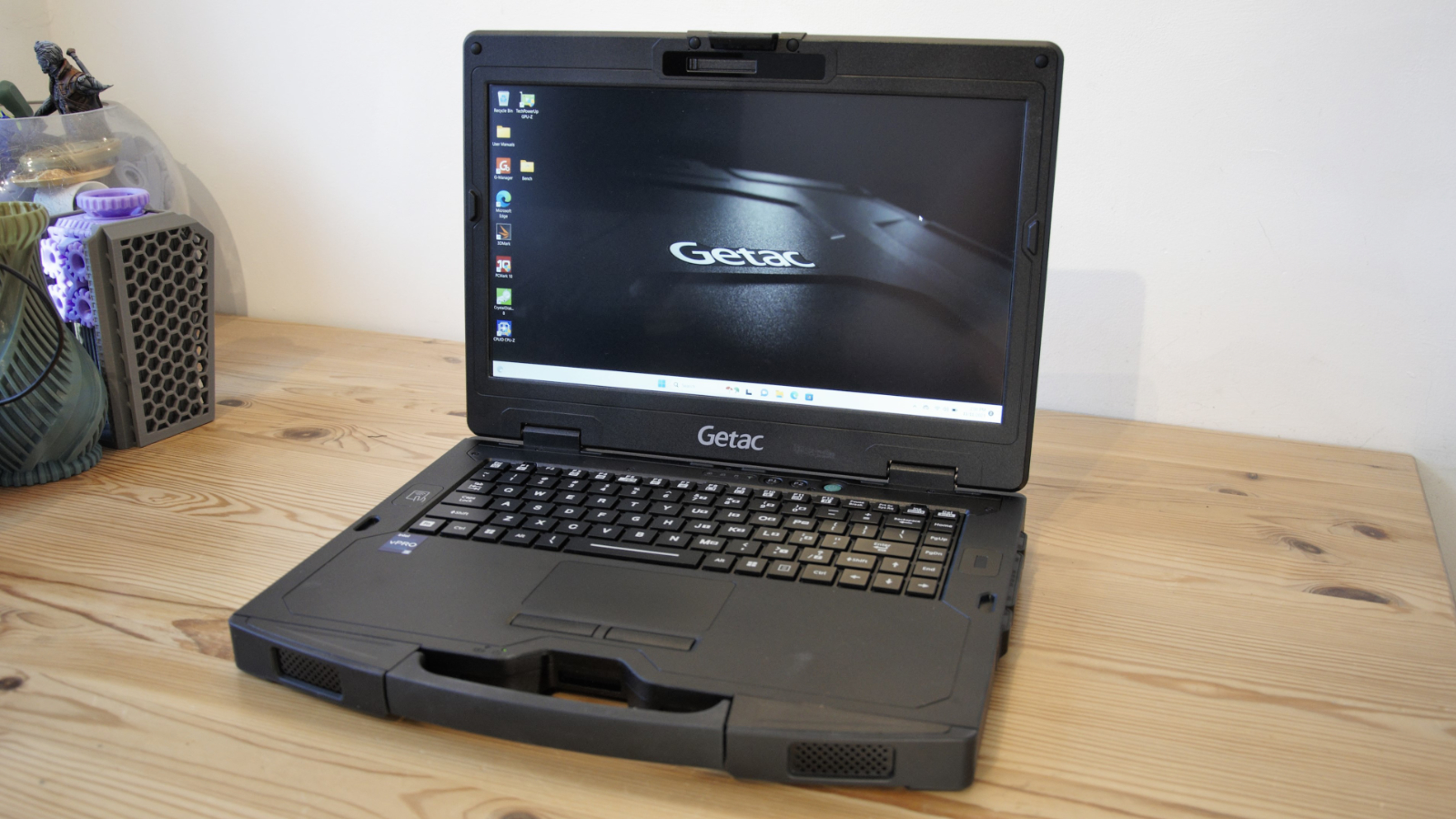Getac: Rugged mobile technology is stronger than ever, but we're sticking to computing devices for now
Paul Waddilove, Managing Director, UK & Nordics at Getac reveals what to look for when buying a rugged device and why we won't see a Getac rugged phone any time soon

Sign up for breaking news, reviews, opinion, top tech deals, and more.
You are now subscribed
Your newsletter sign-up was successful
We’ve always admired rugged mobile technology. Faster processors, higher resolution screens, intuitive operating systems - they’re all essential and impressive. But the build quality and durability of laptops, tablets, phones all capable of surviving unimaginable drops, shocks, and environmental extremes is in a league of its own.
There’s a reason for the growing popularity of the best rugged laptops, tablets, and phones. After all, those better specs won’t mean much when the display shatters, when dust and sand carpet the motherboard. According to one survey, the tablet PC market alone is forecast to be worth over $1900 million by 2032. It’s a trend replicated for rugged laptops and phones. One of the companies leading the way in mobile solutions protected against the elements is Getac.
We spoke to Paul Waddilove, Managing Director, UK & Nordics at Getac to find out what the future holds for rugged devices and frontline workers who depend on them.
- Is Getac planning to have its own line of rugged smartphones similar to Cat? If not, why?
Getac’s core focus has always been on providing rugged tablets and notebooks that meet the needs of our customers across a wide range of industries and sectors. The smartphone market is an exciting and innovative one, but it is also extremely contested and not where our core expertise lies. While we’re always interested to see the latest smartphone devices being launched, rugged or otherwise, it’s not a market we plan to explore from a commercial perspective.
- How are Android-based rugged tablets different from Windows-based ones?
Android and Windows rugged tablets share a lot of similarities, but also have a few key differences. Which one is best suited to a customer will largely depend on their individual use case. Generally speaking, Windows-based tablets tend to be larger and more powerful, while Android-based devices are smaller and offer greater flexibility/scalability.
The Android platform also receives more regular updates, while things like Google integration and its App ecosystem can be a better fit for some customers. Conversely, a key feature of Windows is its longer OS lifecycles, which can be crucial for organisations that want to build new applications around it. Personal preference is also a factor. Some customers are simply used to running Windows and want to stay with it, and vice versa.

- A lot of the big names out there seem to have stopped producing their rugged devices. Why do you think that is the case?
This isn’t something we’ve seen. In fact, the rugged sector is getting increasingly competitive all the time with new products and solutions coming to market on a regular basis. A key driver for this is growing demand for rugged solutions, as more and more businesses build up their digital knowledge and start leaning towards rugged solutions to solve their day-to-day technology challenges.
Sign up to the TechRadar Pro newsletter to get all the top news, opinion, features and guidance your business needs to succeed!
As a rugged tech specialist with over 35 years of experience, we work closely with all our customers to deliver rugged solutions that solve their unique problems and challenges. This ranges from Windows tablets like the UX10-IP that paramedics can easily clean and disinfect after each patient, through to intrinsically safe Android devices, which can help deliver digital transformation in potentially explosive environments.
- Paradoxically, there has been a surge in products that have been labelled IP68 and MIL-STD-810G. Can they be considered rugged once they've been tested to these standards?
There’s definitely a growing trend amongst consumer tech manufacturers to include things like IP68 and MIL-STD 810* certification in their products. However, building true rugged products is a highly specialised process that encompasses far more than simply adding a bit of extra protection to commercial off the shelf products. As such, a lot of these devices in question aren’t internally designed or built for rough handling and/or use in harsh environments, meaning they can’t really be considered true rugged devices. Furthermore, many companies that boast IP and MIL-STD certification have self-certified their own products, without any independent testing or verification. This makes it questionable how well they would really stand up in scenarios where rugged devices are required. Getac’s rugged devices are all independently tested and certified, meaning customers can buy them with confidence.
Other tell-tale signs that products aren’t quite as rugged as they appear are things like limited warranties, so it’s always wise to check this before making a purchase. True rugged manufacturers stand behind their products and this is reflected in their warranties. For instance, ours - and a lot of our peers - come with a three-year warranty covering accidental damage as standard.
- How does the future look for rugged devices?
The future looks very bright, with more and more customers embracing rugged tech to drive business efficiencies, increase connectivity, digitalise operations and adopt emerging technologies.
As the market continues to evolve, expect to see more AI-powered applications being integrated into the rugged ecosystem to help customers solve key challenges and further streamline their operations. Customisation is also expected to become more prevalent, with rugged manufacturers giving customers the chance to fully tailor their solutions and specs based on their specific needs.
- What are the five things to look for when you buy a rugged tablet or laptop?
There are many factors to consider when selecting the right rugged device, but below are five of the key things to look out for:
Rugged certifications: All rugged devices are IP and MIL-STD certified, but as mentioned above, many manufacturers self-certify their products, which makes it hard to know how rugged they really are. True rugged manufacturers will have their devices independently certified, so be sure to look out for this when choosing a rugged device. MIL-STD 810* is considered the benchmark for rugged devices, along with an IP rating of 53 or above.
Battery life: This is a key consideration for anyone that wants to use their rugged devices for long periods of time in the field, where there’s no access to charge facilities. Look for devices that can accommodate high-capacity batteries and allow the user to hot swap batteries on the go, without having to switch the device off first.
Connectivity options: Rugged devices typically feature multiple connectivity options, including Bluetooth, Wi-Fi, GPS, and 4G/5G, enabling users to be productive in a wide range of environments. When it comes to connectivity options, the more a device has, the better.
Support, service, OS longevity: Before purchasing a rugged device, customers should make sure it comes with a level of support that fits their needs. This includes things like service and repair, diagnostic assistance, and provision of any software drivers that might be required. Another key thing to look at is OS longevity, particularly if their app ecosystem is built around a specific version.
Warranty: As mentioned above, true rugged manufacturers stand behind their products, which is reflected in the warranty they come with. We offer a three-year Bumper-to-Bumper warranty covering accidental damage as standard on all fully rugged products. If a fully rugged device doesn’t come with a warranty like this, it’s best to steer clear.
Read more from TechRadar Pro
- For more durable tech, we tested the best rugged phones
- Stay productive in the field with the best rugged tablets
- Check our Getac S410 G5 rugged laptop review

Désiré has been musing and writing about technology during a career spanning four decades. He dabbled in website builders and web hosting when DHTML and frames were in vogue and started narrating about the impact of technology on society just before the start of the Y2K hysteria at the turn of the last millennium.